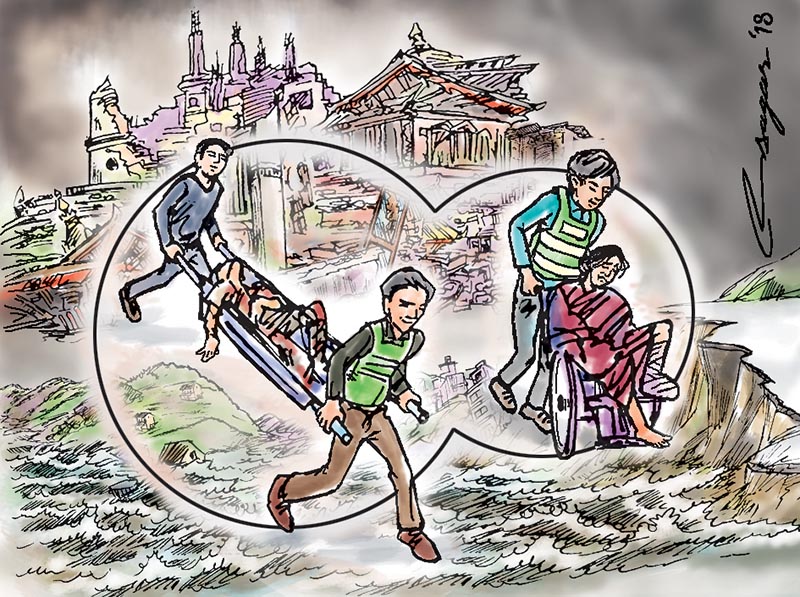World Humanitarian Day: Protecting civilian workers
The joint action of governments, civil society, NGOs and INGOs, and international community is the best recipe to ensure that disaster risks are prevented or mitigated whenever possible
This year’s World Humanitarian Day, which took place on August 19, marks the fifteenth anniversary since the attack on the Canal Hotel in Baghdad, Iraq which killed 22 people, including the Special Representative of the Secretary-General for Iraq, Sergio Vieira de Mello. In 2008, the UN General Assembly adopted a resolution designating 19th August as World Humanitarian Day.
For the last ten years, World Humanitarian Day has brought people around the world together to rally support for people living in humanitarian crises and to pay tribute to the aid workers who assist them. In 2017 on World Humanitarian Day more than two million people took social action through the #NotATarget campaign and urged global leaders to do a better job of protecting civilians, humanitarian and health workers in conflict zones. The event was marked here in Nepal.
The UN estimates that in 2017 more than 26,000 civilians were killed or injured in targeted or indiscriminate attacks in six countries. Since the attack on the Canal Hotel fifteen years ago more than 4,000 humanitarian workers have been killed, injured, detained, kidnapped and prevented from supporting people in need. In the first three months of 2018, there have been 149 attacks on health workers, health facilities and hospitals across 13 countries. Such attacks on healthcare facilities and personnel in these 13 countries have resulted in 221 deaths - over half of them in Syria.
Those humanitarian personnel and civilians living in conflict affected locations continue to face such grave risks is unconscionable and deeply shameful. On World Humanitarian Day we reflect on these sombre statistics and collectively we call for change.
In 2018 the #NotATarget campaign reaffirms the world’s commitment to the norms that uphold humanity and recognises the courage, compassion and selflessness of humanitarians.
Thankfully Nepal does not suffer from the egregious violence that has blighted Yemen, Syria, Afghanistan and other countries. And unlike many countries humanitarian personnel in Nepal are not subjected to armed attacks, arrest or detention.
I believe the answer is obvious: In recent years millions of Nepalis have suffered hugely as a result of natural disasters and humanitarian workers across the country have been instrumental in responding to their needs. It is appropriate that we recognize and applaud the work of community volunteers and staff from the Nepal Red Cross Society, national and international non-government organizations and UN agencies who have worked tirelessly in their endeavours to address human suffering. Drought, floods, landslides and major damaging earthquakes have rocked Nepal in the last five years.
On World Humanitarian Day, it is important to remember as well that despite the assistance brought to affected populations by these dedicated humanitarian workers, people continue to suffer long after the disasters have occurred; the long list includes families still homeless and awaiting the much needed support to rebuild their houses, those whose livelihoods were destroyed and continue, to this day, to face hardship and poverty being deprived of their means of subsistence. So, let us not forget those Nepalis whose lives have been disrupted and who are still experiencing privations owing to the impact of past disasters. Only 12 months ago more than 1 million Nepalis were affected by monsoon flooding. Tens of thousands of houses were destroyed with economic losses estimated at more than US$584 million.
National governments are, of course, primarily responsible for the safety and well-being of its citizens before, during and after disasters have occurred. In Nepal this obligation is taken seriously. For example, in September 2017 Nepal’s parliament passed the Disaster Risk Reduction and Management Act.
The act paves the way for the establishment of a Disaster Risk Reduction and Management Authority and makes clear how Nepal will manage those risks that it is exposed to. More generally the act signals Nepal’s commitment to disaster mitigation and preparedness. It makes clear Nepal’s wish to limit human suffering through proactive action.
I would like to use the tenth World Humanitarian Day to not only praise the efforts of humanitarian personnel in Nepal but to acknowledge the leadership of the government also. I would also like to recognize that the joint action of governments, civil society, NGOs and INGOs, and international community is the best recipe to ensure that disaster risks are prevented or mitigated whenever possible, and that affected populations - who are often the most destitute and excluded - are assisted, their lives saved and their livelihoods protected or rebuilt to avoid the tragic vicious cycle of disaster and poverty.
In Nepal we are fortunate to have a proactive government, a vibrant civil society and a committed international community that have taken important steps to protect the people of Nepal through disaster mitigation and preparedness efforts. Long may this collaboration continue.
Finally, let me remind you that civilians and, of course, humanitarian workers are #NotATarget There are rules governing combatants’ behaviour in war. Every time those rules are broken, human suffering intensifies.
Ms Julliand is the UN resident coordinator in Nepal






